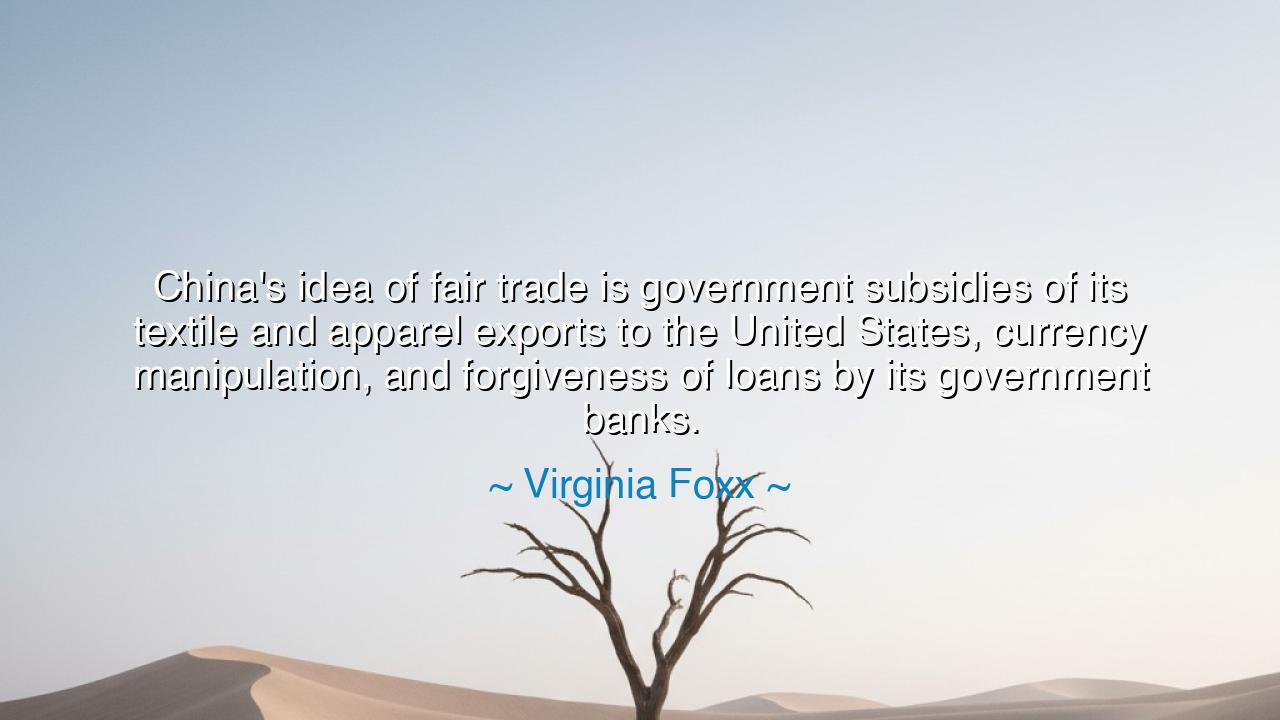
China's idea of fair trade is government subsidies of its textile
China's idea of fair trade is government subsidies of its textile and apparel exports to the United States, currency manipulation, and forgiveness of loans by its government banks.






Host: The factory floor was nearly silent now, save for the faint hum of the last few machines winding down after a long shift. The air smelled of fabric dye and oil, sharp and metallic. A single strip of fluorescent light flickered, bathing the cavernous space in tired blue.
Stacks of cotton bundles and rolled denim filled the corners like silent witnesses to the conversation that was about to begin.
Jack stood near the old cutting table, his sleeves rolled, his hands resting on the edge of the scarred wood. The lines of fatigue on his face were deepened by something more than exhaustion — something heavier, like resentment disguised as resolve.
Jeeny leaned against a column, arms crossed, dark eyes reflective, her voice calm but edged with empathy.
On the wall behind them hung a faded quote on yellow paper, typed and underlined:
“China’s idea of fair trade is government subsidies of its textile and apparel exports to the United States, currency manipulation, and forgiveness of loans by its government banks.” — Virginia Foxx
Jeeny: quietly “Virginia Foxx said that years ago, but it feels like she could’ve said it yesterday.”
Jack: grimly “Yeah. And the story hasn’t changed much — except the factories keep closing faster.”
Jeeny: softly “You sound bitter.”
Jack: looks around the empty floor “Wouldn’t you be? Twenty years ago, this place had six hundred workers. Now it’s me, the machines, and memories of paychecks that actually meant something.”
Jeeny: pauses, gently “You think China’s the reason?”
Jack: snorts “I think cheap labor is the reason. But China? They wrote the playbook. Subsidize exports, keep currency low, undercut the world. Call it competition.”
Jeeny: carefully “Or call it strategy.”
Host: The fluorescent light buzzed, flickered again. The sound filled the space between them like static — that sharp, uneasy hum of something breaking and refusing to die quietly.
Jack: leans back against the table, rubbing his temples “Strategy? Jeeny, strategy is what you do to win fairly. What they’re doing — what they’ve always done — is stacking the deck. They flood markets with underpriced goods, then call it global progress.”
Jeeny: softly, but firm “And we buy them, Jack. Every one of us. You can’t blame only the hand that sells — not when we’re the ones reaching for the discount.”
Jack: quietly, almost bitterly “You’re saying this is our fault.”
Jeeny: shrugs “I’m saying it’s collective. We love cheap things — cheap shirts, cheap phones, cheap victories. But someone always pays the price for cheap.”
Jack: nods slowly “Yeah. People like my crew. Like the family that ran this floor before me.”
Host: The wind from the open window stirred the scraps of fabric on the floor, making them flutter like fallen flags. The sound of the city outside — distant horns, tired traffic — bled faintly into the room, a reminder of a world that keeps moving while some are left behind.
Jeeny: after a long pause “You know what’s strange, though? Foxx wasn’t wrong — but she was selective. Every country does it in its own way. America subsidizes agriculture. Europe props up industry. Everyone calls it fair when it benefits them.”
Jack: smiles grimly “Fair trade is just marketing.”
Jeeny: nods “Exactly. Fairness is a word countries use when they want to sound moral about self-interest.”
Jack: quietly “So what, Jeeny? We just give up? Call it the price of progress?”
Jeeny: gently “No. But maybe the answer isn’t isolation — it’s innovation. You can’t out-subsidize them. You can only outthink them.”
Jack: half-laughs “That’s easy to say when you’re not watching your machines rust.”
Jeeny: softly “Maybe rust isn’t the end. Maybe it’s a reminder — that the world’s changing faster than our pride.”
Host: The light finally steadied, washing the factory in even, cold brightness. The machines stood silent, hulking and lifeless, yet somehow still full of the ghosts of production — like old warriors who’d forgotten the sound of victory.
Jack: after a long silence “You know what really gets me? They call it free trade. But free for who? The government writes checks. Banks erase loans. Workers vanish.”
Jeeny: quietly “And somewhere, another worker gets a job because of it. Maybe a poor girl in a small town gets to feed her family because a shirt sells for two dollars less here.”
Jack: pauses, his voice softening “You think that makes it fair?”
Jeeny: sighs “No. But it makes it complicated.”
Jack: nods slowly “That’s the world now, isn’t it? Everyone surviving someone else’s loss.”
Jeeny: quietly “It always has been. The question is whether we keep pretending that’s the only way.”
Host: A train whistle echoed faintly from somewhere across town — low, mournful, carrying a rhythm that sounded like distance and inevitability. The smell of old oil lingered in the air, heavy and human.
Jack: after a pause “You know what I miss most? The noise. The sound of fabric moving through machines. The chatter. The sweat. You could hear purpose in the air back then.”
Jeeny: smiling softly “Maybe purpose hasn’t left. Maybe it’s just waiting for a new language.”
Jack: frowns slightly “And what language is that?”
Jeeny: steps closer, resting a hand on the table “Innovation. Sustainability. Self-respect. You rebuild not by beating them at their game — but by making one they can’t play.”
Jack: quietly “You sound like you still believe in us.”
Jeeny: smiles faintly “I believe in you.”
Host: The light shifted, turning the factory into a cathedral of faded ambition. The shadows softened, the machines seemed to breathe again — not with noise, but






AAdministratorAdministrator
Welcome, honored guests. Please leave a comment, we will respond soon